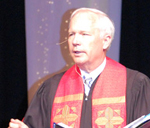Since 2004, William H. Willimon has served as a Bishop in the United Methodist Church responsible for overseeing 57,000 members and 792 pastors in North Alabama. Previously, he served for twenty years as Dean of the Chapel and Professor of Christian Ministry at Duke University. Willimon is the author of over sixty books including two best sellers: Sinning Like a Christian: A New Look at the Seven Deadly Sins and Thank God It’s Friday: Encountering the Seven Last Words from the Cross. (Read my review of his 2010 book Why Jesus? here.) In 1996, a survey conducted by Baylor University named him one of the Twelve Most Effective Preachers in the English-speaking world. A 2005 study by the Pulpit and Pew Research Center found that Bishop Willimon is the second most widely read author by mainline Protestant pastors.
Book Basics
The editors of this collection of Willimon’s work crafted a volume that reads like a conversation. Powerful and thought provoking vignettes are grouped into thematic chapters that develop in a logical order: Jesus, Trinity, Bible, Bad News, Good News, Following Jesus, The Church and the World, Worship, Preachers, and Pastors. While one can experience the entire text within a few short hours, readers can only process the considerable wisdom through a much slower and deliberate reading with significant pauses between chapters for reflection (and ideally discussion with others).
Brief excerpts from three chapters (Bible, The Church and the World, and Preaching) follow:
- “Scripture has a marvelous way of arguing with itself, correcting itself, one witness giving countertestimony to another. Scripture is a record of a people’s determination to hear God truthfully and then to follow God faithfully. The record is in the form of a journey through many centuries. Scripture is the account of the adventure of a journey, not a report on having arrived at a destination” (p.27).
- “Neophilia has become the status quo demanded by a capitalist economy. Neither Scripture nor Christian tradition told these churches that “new” is the chief virtue of the church. What passes these days for new tends to be an uncritical capitulation to the culture, subservience of a ‘tradition’ of the past three decades under the guise of innovation. In loving new more than Jesus, we lay bare our deep accommodation to a capitalist culture . . . Any church that acts like a shopping mall is sure to be treated that way” (p.120).
- “Preaching is the proclamation of the Word of God. It is neither moral exhortation (the gospel is demeaned and our human situation is denied by reducing preaching to moral exhortation), nor a heartfelt expression of the preacher’s personal piety (who cares?). Preaching is not, despite the history of rhetoric, primarily a matter of persuasive speaking . . . The goal of preaching is embodiment, discipleship more than mere intellectual assent or aesthetic appreciation” (p. 143, 147).
So What?
Story is a rich, memorable, and meaningful way to disseminate information. Like Jesus, Willimon is a master storyteller.
- How many of Jesus’ stories can you recall? Which have impacted you most?
- What other stories (those from sermons, classes, books, friends, etc.) have helped shape your understanding of what it means to follow the Way of Jesus?
- Tell your faith story in 3 minutes or less.
Will Willimon. The Best of Will Willimon: Acting Up in Jesus’ Name (2012, Abingdon Press). ISBN: 9781426742026.
